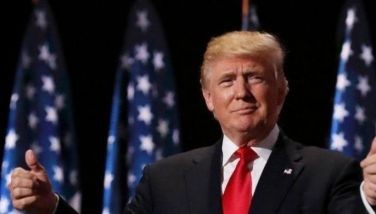Solons hit US story on tobacco bribes
February 3, 2002 | 12:00am
Members of the House of Representatives are up in arms over a Washington Post article accusing Philippine legislators of receiving bribes from big tobacco companies to block the passage of a national law that would regulate the tobacco industry.
"I am concerned and, at the same time, appalled by the article because it questions our integrity. This should serve as a challenge for all of us in the 12th Congress to disprove it by finally passing a measure that will regulate the tobacco industry," Valenzuela Rep. Magtanggol Gunigundo I said.
Angered by the same article, House committee on trade and industry chairman Harry Angping vowed to fast-track the consolidation of the various tobacco regulation measures to ensure its immediate passage in the House.
"The passage of the National Tobacco Control Act would definitely become a reality under this 12th Congress," Angping said, eliciting applause from the participants in the initial public hearing of House Bill 114, authored by Gunigundo, and other tobacco-related legislation.
HB 114 seeks to promote a smoke-free environment by regulating the production, manufacture, labeling, advertisement and sale of tobacco products.
"This will be one of the legacies of the 12th Congress to the Filipino people," Angping said, acknowledging that the counterpart measure in the upper chamber, Senate Bill 1859, has already been passed on third and final reading.
Aside from Gunigundo and Angping, among those who protested the Washington Post article were the authors of other tobacco regulation bills such as Reps. Cynthia Villar, Rozanno Rufino Biazon, Roseller Barinaga, Eric Singson and Ted Failon.
The Washington Post article entitled "Trade and tradeoffs on tobacco" said that "in an ideal world, all cigarettes would be regulated, whether imported or local. But in the real world, trade makes regulation hard, especially in poor countries."
"In the Philippines, they (the cigarette companies) showered politicians with money and produced a scientist who testified against taking lung cancer seriously," the article said, which Gunigundo read before the Committee. The article was reprinted by one of the national dailies.
In introducing HB 114 or the postponed National Tobacco Control Act, Gunigundo stressed the need to pass such legislation, citing a World Health Organization (WHO) report which said smoking is the No. 1 health problem and tobacco is believed to be the probable cause of diseases.
"We wish to make it clear that we agree with the overwhelming medical and scientific consensus that cigarette smoking is addictive and that it causes lung cancer, heart disease, emphysema and other serious diseases in smokers," said PMPh corporate affairs manager Bayen Bravo.
However, Bravo said Philip Morris also strongly believes that tobacco consumption is a decision that informed adults should be free to make despite the attendant health risks.
Bravo pointed out that PMPh reiterates its commitment to work cooperatively and constructively with Congress to address complex tobacco issues that will eventually lead to the passage of a comprehensive tobacco control legislation.
"Philip Morris Philippines Inc. is committed to working with Congress, civic and international organizations, and the public health community to find effective regulatory solutions that address complex tobacco issues at the national level in the Philippines," she said.
Bravo extended the company’s exhortation for Congress to pass legislation on tobacco based on the following principles.
• Effective measures should be taken to prevent minors from smoking;
• Smoking-related decisions should be made on the basis of a consistent public health message about the dangers of smoking;
• The right of adults to choose to smoke should be preserved; and
• All manufacturers of tobacco products should be subjected to the same, consistently enforced rules so that they can compete on a level playing field.
"I am concerned and, at the same time, appalled by the article because it questions our integrity. This should serve as a challenge for all of us in the 12th Congress to disprove it by finally passing a measure that will regulate the tobacco industry," Valenzuela Rep. Magtanggol Gunigundo I said.
Angered by the same article, House committee on trade and industry chairman Harry Angping vowed to fast-track the consolidation of the various tobacco regulation measures to ensure its immediate passage in the House.
"The passage of the National Tobacco Control Act would definitely become a reality under this 12th Congress," Angping said, eliciting applause from the participants in the initial public hearing of House Bill 114, authored by Gunigundo, and other tobacco-related legislation.
HB 114 seeks to promote a smoke-free environment by regulating the production, manufacture, labeling, advertisement and sale of tobacco products.
"This will be one of the legacies of the 12th Congress to the Filipino people," Angping said, acknowledging that the counterpart measure in the upper chamber, Senate Bill 1859, has already been passed on third and final reading.
Aside from Gunigundo and Angping, among those who protested the Washington Post article were the authors of other tobacco regulation bills such as Reps. Cynthia Villar, Rozanno Rufino Biazon, Roseller Barinaga, Eric Singson and Ted Failon.
The Washington Post article entitled "Trade and tradeoffs on tobacco" said that "in an ideal world, all cigarettes would be regulated, whether imported or local. But in the real world, trade makes regulation hard, especially in poor countries."
"In the Philippines, they (the cigarette companies) showered politicians with money and produced a scientist who testified against taking lung cancer seriously," the article said, which Gunigundo read before the Committee. The article was reprinted by one of the national dailies.
In introducing HB 114 or the postponed National Tobacco Control Act, Gunigundo stressed the need to pass such legislation, citing a World Health Organization (WHO) report which said smoking is the No. 1 health problem and tobacco is believed to be the probable cause of diseases.
"We wish to make it clear that we agree with the overwhelming medical and scientific consensus that cigarette smoking is addictive and that it causes lung cancer, heart disease, emphysema and other serious diseases in smokers," said PMPh corporate affairs manager Bayen Bravo.
However, Bravo said Philip Morris also strongly believes that tobacco consumption is a decision that informed adults should be free to make despite the attendant health risks.
Bravo pointed out that PMPh reiterates its commitment to work cooperatively and constructively with Congress to address complex tobacco issues that will eventually lead to the passage of a comprehensive tobacco control legislation.
"Philip Morris Philippines Inc. is committed to working with Congress, civic and international organizations, and the public health community to find effective regulatory solutions that address complex tobacco issues at the national level in the Philippines," she said.
Bravo extended the company’s exhortation for Congress to pass legislation on tobacco based on the following principles.
• Effective measures should be taken to prevent minors from smoking;
• Smoking-related decisions should be made on the basis of a consistent public health message about the dangers of smoking;
• The right of adults to choose to smoke should be preserved; and
• All manufacturers of tobacco products should be subjected to the same, consistently enforced rules so that they can compete on a level playing field.
BrandSpace Articles
<
>
- Latest
- Trending
Trending
Latest
Trending
Latest
Recommended































